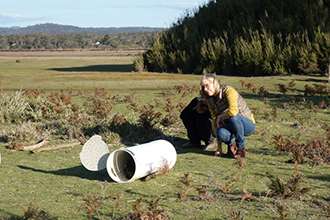World first trial of Tasmanian devil vaccine begins in the wild

The fight to save the Tasmanian devil from a deadly cancer decimating their populations has been buoyed today by the first release of animals vaccinated against the disease.
Nineteen devils immunised against the Devil Facial Tumour Disease (DFTD) will be released today into Narawntapu National Park in northern Tasmania, an important step in the quest to save the Tasmanian devil from extinction.
It is the first time a vaccine against the deadly cancer threatening the species has been tested in the wild. The study was led by researchers from the Menzies Institute of Medical Research at the University of Tasmania, in collaboration with the Walter and Eliza Hall Institute and CSL Limited.
Previous laboratory trials of the vaccine, led by Menzies immunologist Professor Greg Woods and the devil research team, were able to successfully activate the devils' immune response to fight the cancer cells.
Professor Woods said that, of the 19 devils to be released, 18 had produced an immune response in captivity. "This is an excellent outcome, but the real test will be determining whether the vaccine is effective in protecting devils in the wild, hence the release at Narawntapu," Professor Woods said.
Walter and Eliza Hall Institute researchers Professor Lynn Corcoran and Dr James Murphy contributed their immune and protein knowledge to the project.
Professor Corcoran said previous work with the Menzies research team showed that the tumour cells thrived by hiding from the immune system.
"The tumours are able to effectively 'fly under the radar' and evade immune detection," Professor Corcoran said. "We developed tools to measure antibody responses and produced natural devil proteins that stimulate tumour cells to 'reveal' themselves to the immune system."
Dr Murphy said he was excited to be involved in this first trial against an otherwise universally fatal disease. "We hope that this vaccination strategy will allow the devil's immune system to work as it should, and destroy tumour cells before they can cause disease," he said.
The 19 devils will be monitored after their release and regular blood samples collected to confirm that the immune response is still active. If not, the devils may require a booster.
Menzies is working in partnership with the Save The Tasmanian Devil program, as well as national and international scientific collaborators, to help achieve the Tasmanian devil's long-term survival in the wild.
Menzies and the University's School of Medicine have developed the immunisation technique in association with Dr Martin Pearse, Dr Adriana Baz Morelli and Ms Anabel Silva from CSL Limited. Adjuvant (substances to promote vaccine efficacy), vaccine expertise and financial support has been provided by CSL Limited as part of efforts to support the research community in Australia.
Professor Woods said the support of the Australian Research Council and the Save the Tasmanian Devil Appeal was critical for their ongoing work.
"Public donations and corporate support received by the devil appeal reached an all-time high in 2014, with over half a million dollars raised, allowing the appeal to fund some of the outstanding success we have witnessed in the past few years," he said.





















